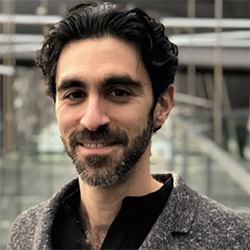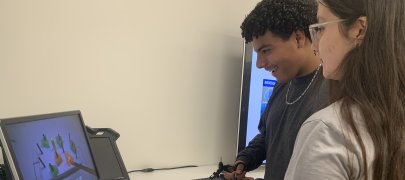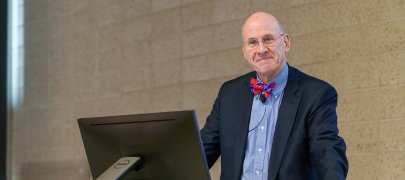Asking Algorithms and Ourselves the Right Questions
Algorithms might be the answer to some of health care’s most challenging questions — from measuring health care management to understanding health disparities and bias. Ziad Obermeyer, MD, an associate professor of Health Policy and Management at UC Berkeley School of Public Health, discussed how these algorithms can benefit the health care system, but can also stumble when asking tough questions.

Dr. Obermeyer started his presentation by discussing specific, measurable, attainable, relevant and time-based (SMART) setting goals. He provided a few examples of ways to set these realistic and measurable goals, including the goal of having a good life. In order to measure the goal of having a good life, you need to define a proxy.
Dr. Obermeyer said that these proxies remind him of a genre of joke called the literal genie joke. These are jokes that start like, “I want to be rich,” and the genie says, “okay, Rich. What is your second wish?”
“We need to be careful what we wish for in life with proxy measures and algorithms, because algorithms are the genie that you can ask anything you want, but you have to be really careful,” he said.
Dr. Obermeyer’s work is related to population health management. The idea of improving clinical health outcomes of a defined group of individuals by being proactive and intervening before patients get sick. An example of this is highly trained nurses who are on call when patients have a problem. If that phone call leads the nurse to worry that a patient needs help, that nurse can arrange for a same day primary care visit, do at-home visits, rearrange medication and refill prescriptions.
“The problem is, all of that stuff is expensive,” Dr. Obermeyer said. “We cannot do this for everyone; we just don’t have the resources to do it. We need to target those things for the people who really need it. That is where algorithms come in.”
Algorithms make decisions about population health management interventions for the majority of the U.S. population, according to Dr. Obermeyer. They predict the patients who will get sick, need hospitalization, rehabilitation and patients who will consume a lot of health care resources. However, these algorithms sometimes stumble.
Dr. Obermeyer provided an example of an algorithm that was designed to predict who will be using a lot of health care resources within the next year. Imagine there are two patients and the algorithm predicts both these patients will have a high-risk score of 97.
“It stands to reason that these two patients should go on to have the same needs for that health care and population health management, regardless of the color of their skin,” Dr. Obermeyer said.
However, that is not the case. Researchers found that the first patient, who was white, had mild depression, took citalopram, had a knee replacement earlier in the year and is now healthy. The second patient, who was black, had diabetes, heart failure and COPD. He was on insulin and seven other medications. Over the course of this year, where they predicted his utilization, he had two ER visits, two hospitalizations, one ending up in a prolonged rehab stay.
“In general, when we looked at patients who had the same algorithm score, patients of color had more active chronic illness; they had biomarkers consistent with worse health, like higher blood pressure, worse kidney function, worse anemia, etc. It doesn’t matter how you measure this health. What we saw was black patients with the same score who were on average far less healthy,” Dr. Obermeyer said.
According to that algorithm, only 18 percent of the high-risk group was black. In an unbiased world, that number should have been about 47 percent. When researching the issue, Dr. Obermeyer’s team discovered that it was the question the algorithm was answering — which was high health care costs, rather than health care needs. When they refocused the question on health care needs, the algorithm reduced its bias by 84 percent.
This discovery led to Dr. Obermeyer’s team developing an initiative to help organizations fix algorithm bias and build up data sets to allow the opportunity for more algorithms to be created and adjusted.
“We worry a lot about algorithmic bias, and I think a lot of that work is well founded, but I think there is great cause for optimism,” Dr. Obermeyer said. “Just as algorithms can be biased, they can also be unbiased. Just as they can replicate existing problems with scientific knowledge, they can discover new knowledge by listening to patients. It is going to be up to what data we have available to build algorithms, what seemingly small technical choices we make when we train them. I think that is why this area is so exciting for me, because small things like making data sets available, making the right choice when you are training an algorithm, can make a huge difference.”
Continuing Coverage
- Wired, January 25, 2021 – New Algorithms Could Reduce Racial Disparities in Health Care.
Topics
About the College
Founded in 2007, the University of Arizona College of Medicine – Phoenix inspires and trains exemplary physicians, scientists and leaders to optimize health and health care in Arizona and beyond. By cultivating collaborative research locally and globally, the college accelerates discovery in a number of critical areas — including cancer, stroke, traumatic brain injury and cardiovascular disease. Championed as a student-centric campus, the college has graduated more than 800 physicians, all of whom received exceptional training from nine clinical partners and more than 2,700 diverse faculty members. As the anchor to the Phoenix Bioscience Core, which is projected to have an economic impact of $3.1 billion by 2025, the college prides itself on engaging with the community, fostering education, inclusion, access and advocacy.


